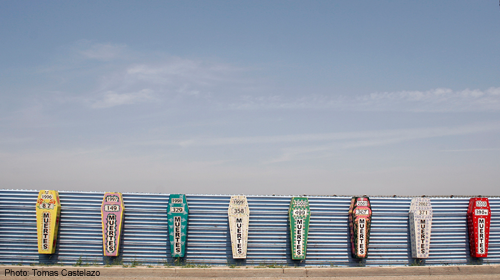
The floating body seen by members of Congress who toured the U.S.-Mexico border this month is the latest emblem of our militarized southwest border. CQ reported that Rep. Leonard Lance (R-N.J.) was “shocked” after seeing “firsthand the tragedies of this border and the loss of life.”
As a border resident of Las Cruces, N.M. myself, who has traveled the border’s entire length extensively, it’s important to put what Rep. Lance saw during his brief visit in context. Yes, many have died in Mexico at the hands of criminal organizations, and thousands of men, women, and children seeking to reunite with family or find work have perished in attempts to cross our border. What I find equally troubling, however, is the reality often overlooked or intentionally ignored by focusing on isolated fragments of border realities. The latest congressional tour is only the most recent incomplete portrayal of border life, providing the American public a partial and sensationalized depiction of our communities. The harmful consequence of these travelogues is to encourage ever more costly, wasteful, and inhumane border enforcement at the expense of real immigration reform.
I wish more members of Congress and citizens from states outside the border region would take time not only to tour our border with official minders, but also to meet with those of us who work daily to respond to the tragedies caused by voracious growth of border security spending into a “mini-industrial-complex.” If they asked, we’d tell them about severe abuses of basic rights and dignity in border communities that accompanied the last decade’s rapid expansion of resources and personnel at the border without corresponding oversight or accountability. And we’re not alone in our assessment or concern; the American public is solidly behind our communities as they seek to end border-security overkill.
The union for border patrol agents, the National Border Patrol Council, has itself acknowledged problems with the race to double the size of its force. Exhaustive documentation exists of U.S. citizens, lawful residents and migrants being abused by Customs and Border Protection (CBP) agents: for example, frequent media reports scrutinize CBP’s uses of force, which include unjustifiable fatal shootings.
If the congressional delegation had visited us here in Las Cruces, N.M., we’d retell the stories encapsulated in our recently released report, Torn Apart. They describe tragedies of border families’ separation as they get caught in ever-expanding border enforcement. In many regions CBP is so over-resourced that patrols creep north and target long-term residents in communities far removed from the border. For example, a 16-year-old boy who spent eight years studying and working the fields to support his younger siblings was picked up approximately 70 miles away from the border. His mother Esperanza prepared his lunch that morning, and the next time they spoke he was 1,000 miles away in Mexico.
Border communities support a fair roadmap to citizenship as well as oversight and accountability of CBP enforcement. Otherwise our neighbors and friends, and their children and parents, will continue to be swept up by the massive dragnet detention and deportation system. These tragedies unfold daily in border communities, and will only worsen as long as we define the border by ignoring its remarkable safety and richness. Insultingly narrow depictions of my home must not get in the way of fiscally responsible and humane border security.
Learn more about immigrant rights and other civil liberties issues: Sign up for breaking news alerts, follow us on Twitter, and like us on Facebook.




